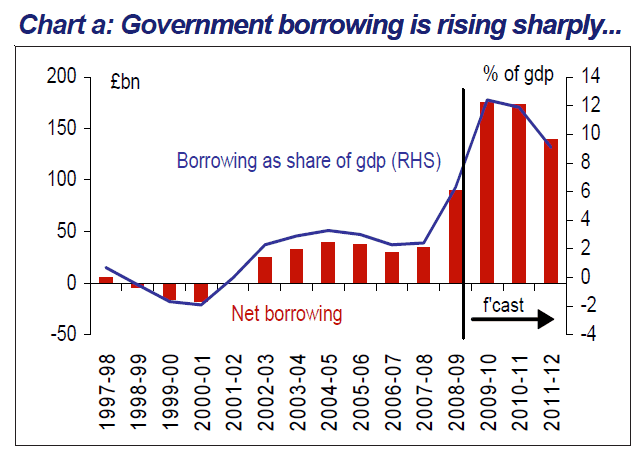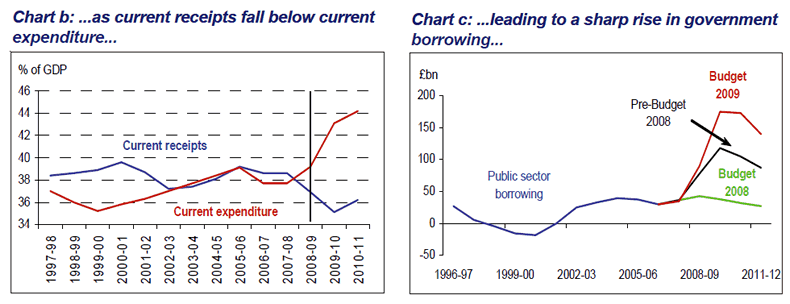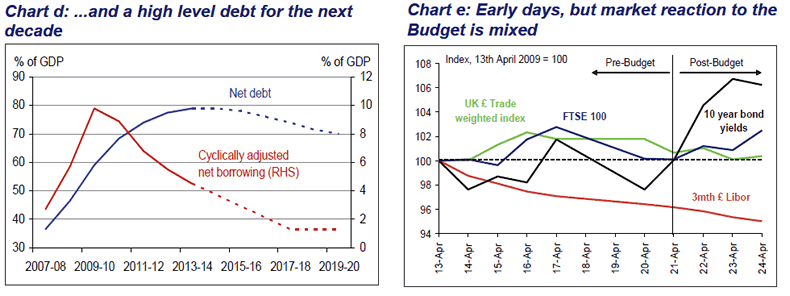Economic Downturn Hits UK Public Finances
Economics / UK Economy Apr 27, 2009 - 03:52 AM GMTBy: Lloyds_TSB
 Overview
Overview
UK Budget 2009 announcements were as grim as
expected. Official borrowing will reach over 12%
of the economy in the current financial year, or £175bn. It will fall only slightly in 2010/11 to £173bn, and to 11.9% of the economy if the official
forecast of 1.25% growth for 2010 proves correct.

If the official growth forecast is not met, however, the actual borrowing outcome in 2010/2011 may be as much or higher than this year. These figures must be seen against the backdrop of a continuing global financial crisis and a world economy in synchronised recession, making it the worst downturn since the 1940s. In spite of the efforts to mitigate the effect of the current crisis, it is still not even clear that the worst is yet over. This is the context for the big increases in public sector government borrowing that were announced in the 2009 Budget. When will recession end and borrowing start falling? From the Budget details, the next two years are assumed to be the worst and so borrowing only starts to fall steeply from 2011/12 as economic growth is assumed to rise by 3.5% in 2011.
There will likely be vigorous debate about whether the medium term projection is one that sets out a path to sustainable deficits. However, the official assumption is that by 2013/14, government borrowing is down to 5.5% of gdp from a peak of over 12% this year and balance is achieved by 2017/18. This is based on tough spending control and assumptions about strong economic growth, efficiency savings and fiscal drag.
Fiscal outlook
The economic downturn is squeezing tax revenues whilst at the same time boosting spending, as unemployment rises. The increase in the Budget deficit to 12% of the economy is a consequence of this, as efforts to rein in the deficit while the recession is ongoing, say through tax rises or spending cuts, would simply make the downturn in the economy worse and ultimately raise the deficit even more. This is partly why it is assumed that public spending growth will slow sharply after trend growth returns, to 0.7% from 2011/12, after a rise of 1.2% this fiscal year and next. But the outlook for the public finances is grim, with net borrowing of 12.4% of the economy this year and 11.9% in 2010/11. By 2013/14, the deficit is projected to decline to 5.5% of the economy, partly a result of an economic assumption that sees growth of 3.5% in 2011 and 2¾% growth a year thereafter. Net debt as a share of the economy is projected to fall back from a 79% peak, from 2013/14 onwards. The stance of the public sector in the medium term is geared towards a net tightening position, as tax revenues rise as a share of the economy though not enough by itself to achieve stability without other assumptions.


Economic outlook
The UK’s economic outlook is not the worst amongst the top seven developed economies, but the
official view from the Treasury is that there will be a contraction of 3.5% this year followed by a
recovery next year to 1.25% growth. The forecast is pretty much in line with the consensus for 2009
but above for 2010. Much of the reduction in the ratios of borrowing and debt in the medium term
projections is dependant on the Treasury forecast for economic growth being proved correct. Inflation
is set to stay low for this year and next; exports to rise as the pound stays weak and consumer
spending to weaken as unemployment rises.
Company and financial market impact
The business specific measures announced in Budget 2009 were aimed at protecting hi tech or
‘green’ sectors, autos and housing and related activities but were understandably fairly small in relation
to the size of the increase in borrowing set to take place. The financial market impact has been
relatively muted so far but the announcement of big increases in government debt and borrowing
may cause further unease in gilts and foreign exchange markets unless they are convinced that the
deficits will come down.
Although it is still too early to properly assess the financial market reaction to the Budget, we have plotted the performance of some sectors of the market. Chart e shows that the biggest shift since the Budget has been in fixed income markets, where there has been a rise in 10-year bond yields, perhaps due to the size of the borrowing requirement for the year ahead. Since the Budget on Wednesday, the ftse 100 is slightly higher. The trade-weighted index of the pound has been modestly volatile since the Budget but has ended the week slightly lower than it started. Chart e also shows that 3m libor has fallen back somewhat, on the basis perhaps that the official forecast for gdp is in line with the more pessimistic view of independent forecasters, at least for 2009. This means that the likelihood is that short term interest rates will stay lower for longer. However, the final judgement on the Budget is still clearly some way off, as intensive analysis of the Budget is still underway.
Trevor Williams, Chief Economist, Corporate Markets
http://www.lloydstsbcorporatemarkets.com/
* All charts are sourced to Lloyds TSB Corporate Markets Economic Research and Datastream
Any documentation, reports, correspondence or other material or information in whatever form be it electronic, textual or otherwise is based on sources believed to be reliable, however neither the Bank nor its directors, officers or employees warrant accuracy, completeness or otherwise, or accept responsibility for any error, omission or other inaccuracy, or for any consequences arising from any reliance upon such information. The facts and data contained are not, and should under no circumstances be treated as an offer or solicitation to offer, to buy or sell any product, nor are they intended to be a substitute for commercial judgement or professional or legal advice, and you should not act in reliance upon any of the facts and data contained, without first obtaining professional advice relevant to your circumstances. Expressions of opinion may be subject to change without notice. Although warrants and/or derivative instruments can be utilised for the management of investment risk, some of these products are unsuitable for many investors. The facts and data contained are therefore not intended for the use of private customers (as defined by the FSA Handbook) of Lloyds TSB Bank plc. Lloyds TSB Bank plc is authorised and regulated by the Financial Services Authority and is a signatory to the Banking Codes, and represents only the Scottish Widows and Lloyds TSB Marketing Group for life assurance, pension and investment business.
Lloyds TSB Archive |
© 2005-2022 http://www.MarketOracle.co.uk - The Market Oracle is a FREE Daily Financial Markets Analysis & Forecasting online publication.



